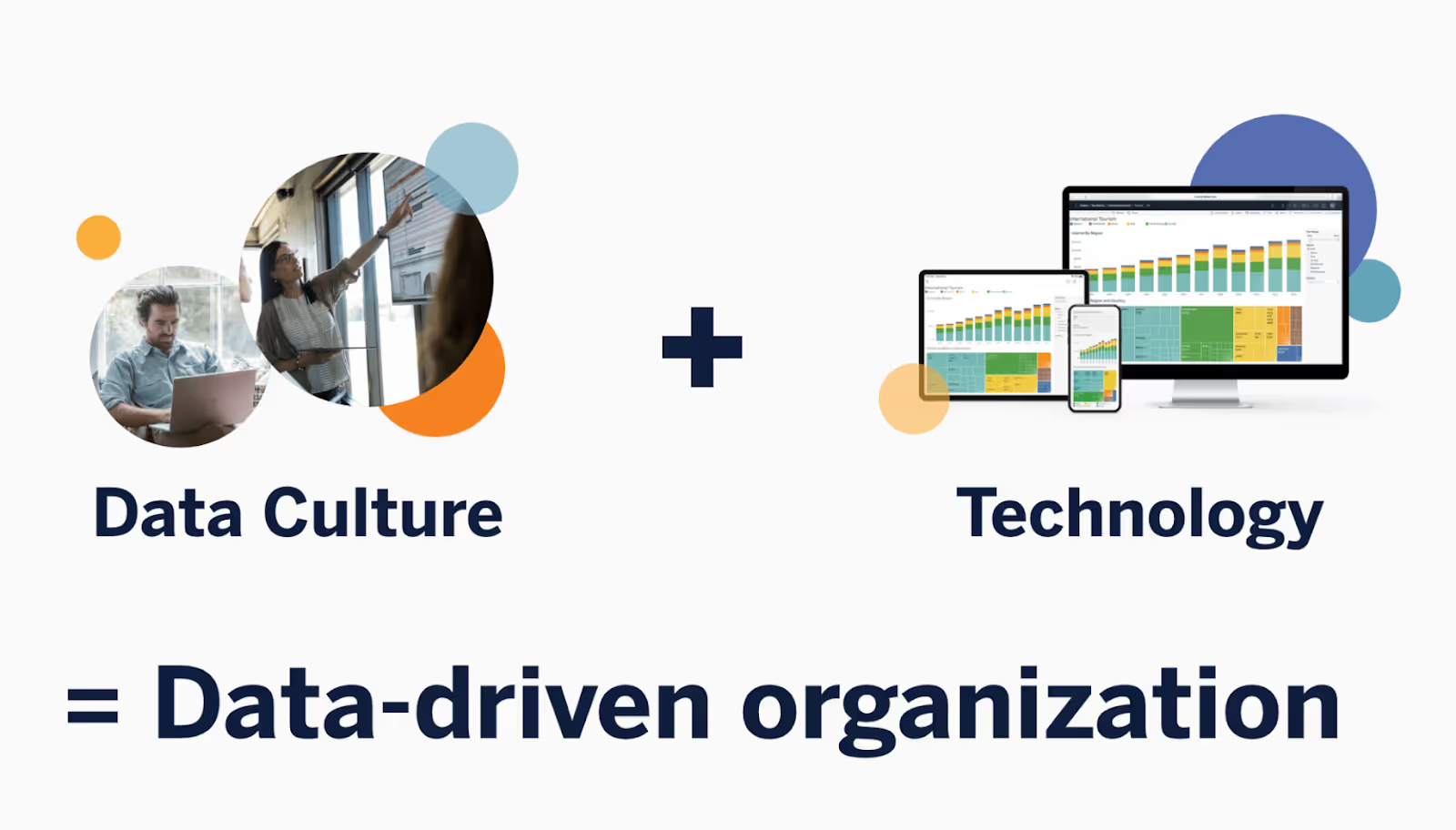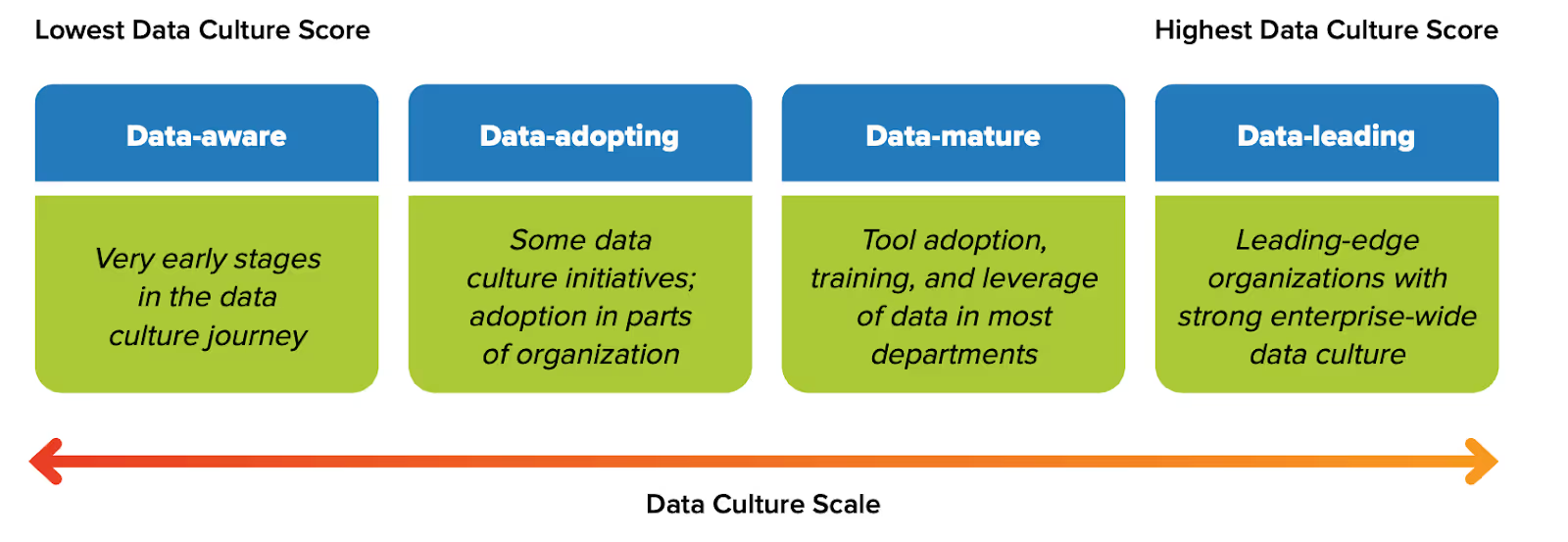Data culture is the collective behaviors and beliefs of people who value, practice, and encourage the use of data to improve decision-making.
Over the next few years up to 2025, IDC has predicted that global data creation will grow to more than 180 zettabytes.
The volume of collected data is higher than ever yet most companies do not fully unlock its value.
That is even though the benefits of being a data-driven organisation are undeniable – being a fully data-driven company means 3x more likely to add customers, 1.5x likely to grow revenue by at least 10%, and 9x more likely to retain customers.1

Organisations try to shift their decision-making from intuition to data-driven decisions, however, 92% fail to do so.
This is because they spend time answering the wrong questions instead of focusing on two main objectives – the right technology and the right organisational mindset – data culture.
What is data culture?
We know how important company culture can be, it affects everything from the hiring process to making executive decisions. But what exactly is data culture?

Data culture refers to how an organisation uses data in terms of making business decisions and it involves values, processes, and practices used within a company.
It can relate to a wide range of activities starting from data collection, and preparation through analysis, visualisation, and finally, management. It also relates to technologies and policies supporting these activities.
In a data-leading company, everyone independently of their role or level is empowered to use data over intuition to make decisions and challenge the ones that are in contradiction with data. Data is openly shared across the organisation encouraging transparency and collaboration.
Objective data-driven decisions are prioritised as opposed to other models when decisions are made based on broad agreement etc. Data is at the center of every conversation, and everyone can see its value.
How to become a data-driven organisation with strong data culture?
Choosing the right technology is usually one of the first steps that companies undertake. However, technology on its own isn’t enough to become a fully data-driven company, people must be willing to change their habits and we all know how difficult that can be.
Old patterns must be broken, new skills developed, and change is encouraged and celebrated. While it is extremely beneficial for companies to shift into the data-focused mindset, showing the people what personal benefits it may bring them can inspire change. Sometimes, the lengthy processes can be replaced by a quick dashboard glance.
Building a data-driven culture must be fully embraced with a deliberate plan and sustained effort, strongly entwined with a company business strategy.
What are the checkpoints on the way to becoming a fully data-driven organisation?
1. Analytics Strategy
The first step is defining the business outcomes, vision, and analytics strategy. How can you fully leverage data? Use cases must be identified and assigned priority. Project teams and executives are formed and the right tools are chosen.
A clear vision of what data-driven culture should look like and how it benefits the company. The change requires executive advocacy and full participation.
Best practices should start on the highest organisational level so the rest can follow confidently. Even though data culture isn’t hierarchical, it must be embraced on all levels, and leadership principles are especially inspiring to the rest.
2. Agility
A secure and stable data environment is created which is responsive and scalable depending on the needs of the organisation. An important factor contributing to the success of creating a data culture is the health of the data. It must be clean, trustworthy, easy to find, and provide value to those who may use it.
Healthy data fosters a sense of ownership, employees feel more accountable, and produce better results. Encourage employees to take ownership of data and its outcomes creating a sense of responsibility for accuracy and quality.
3. Proficiency
Building data literacy empowers asking the right questions, deriving insights, and making decisions. Provide the education programs and resources appropriate to the roles.
Measure the participation and adaption. Develop the best practices. Hire people with advanced data skills.
4. Community
Build a data community to inspire and celebrate progress. Encourage collaboration and teamwork where members of different departments can work together and help each other.
This involves establishing easy communication channels, creating opportunities that encourage collaboration, and appropriate support systems for users.
5. Governance
Establish the right balance between access for exploration and security. This will involve assigning roles and processes to manage data and produced content.
Choose the governance model which would fit your organisational needs best: centralised, delegated, or self-governing. Be open to changes that may be required over time.
6. Measure the progress
Establish and monitor appropriate metrics to measure success. These can include:
- Financial such as revenue, profitability, costs
- Employee – productivity, retention
- Customer – satisfaction, retention
- Offering – innovation, speed-to-market

If you are thinking of leveling up your data maturity to make your organisation data-driven, you can use our free Data Maturity Assessment – it measures where you are on your journey and gives you recommendations to build a plan of action and track the progress.




.avif)
.avif)











